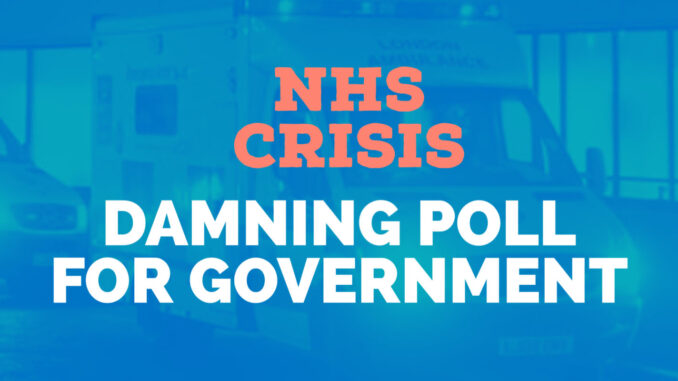

More than two thirds of the public think the NHS is underfunded, including over half of Conservative voters
Samantha Wathan, KONP Press Officer discusses recent poll carried out for Keep Our NHS Public
This week has seen the launch of the Labour party’s vision for the NHS. If successful at the next election, the party have committed themselves to NHS reform as a way to improve the service, largely via increasing access to primary care (the front door to the NHS) as well as a promise to train an extra 7,500 doctors and 10,000 nurses and midwives. There will be more discussion here on Labour’s plans in the near future.
It is also the week where Health Secretary Steve Barclay has threatened legal action against the Royal College of Nursing (RCN) claiming that their planned strike into May, is unlawful. This potentially put their registrations and livelihood at risk. Against a backdrop of so much turbulence it is important to monitor on the public mood during the most serious crisis the NHS has ever experienced.
Recent Polling: a warning for government
A poll commissioned by Keep Our NHS Public (and conducted by Opinium) last month has found that more than two thirds (67%) of the public believe that the NHS is underfunded. Interestingly, 58% of Conservative voters also agree that the NHS does not receive enough funds:
Thinking about all the things the government has to do, would you say the NHS is currently overfunded, underfunded or gets the right amount of money?
Underfunded 67%
Overfunded 7%
It gets the right amount of money 14%
Don’t know 12%
This admission from the government’s own supporters, is highly significant given that at the next election, the NHS will be undoubtedly be a key issue for voters. The results demonstrate too how the government’s incessant spin over increased funding (‘the NHS has had more money than ever before’) has not washed with the electorate who sadly are experiencing the collapse of a once-proud institution first-hand.
Increased funding is urgently needed to recruit and retain staff in order to tackle the gaping hole of around 150,000 vacancies. This will be the only way to reduce waiting lists and improve outcomes for patients. Billions of pounds are also needed to tackle soaring costs for backlog maintenance of the NHS estate and to increase the amount of hospital beds, the number of which seriously falls behind other European health systems. The very limited funding announced recently for ‘virtual wards’ won’t solve waiting list problems given the serious lack of community nursing capacity and inadequate community social care support preventing discharge from hospital.
Public satisfaction
The results of the British Social Attitudes Survey were also announced last month and tragically confirm that just 29% of the public were satisfied with the NHS in 2022 – the lowest score ever recorded.This is 7% points down from the year before and a drop from 2010 (when the Conservatives first came to power) of 70%.
Perhaps unsurprisingly, our poll results tally in an extremely similar way. A total of 67% of those polled thought the NHS was performing badly and over half (55%) believed that the government were primarily responsible for this performance, with only 1% blaming NHS staff for their difficulties:
Would you say the NHS is currently working well or badly?
Well 24%
Badly 67%
In the previous question you said you thought the NHS is currently working badly. Who do you think is primarily responsible for this?
The government 55%
NHS management 34%
NHS patients 2%
NHS staff 1%
Someone else (please specify) 5%
Don’t know 3%
On numerous occasions in the past the government has blamed frontline staff, NHS managers, Covid, flu, strep A infection and even patients for delays and problems in delivering NHS care – in fact any reason but themselves. The public for example, have been told that being obese, smoking, or suffering from a condition deemed to be preventable, has somehow caused the problems in the NHS, conveniently neglecting to mention that public health budgets (including those for smoking cessation) have been absolutely decimated over the last ten years.
NHS staff have been blamed too, and not just around the recent industrial action. In January of this year, deluded Conservative MP Philip Davies wrote to a concerned constituent with the following:
“The problem is that the NHS is appallingly run with far too many overpaid and utterly useless senior managers who wouldn’t be able to get a similar job in the private sector. The NHS is wasteful, bureaucratic and run for the convenience of people who work in the NHS (especially consultants and GPs) rather than for the benefit of the patients…“
The truth is that the NHS has far fewer managers as a proportion of the workforce than businesses in general, and that productivity rose by 16.5% from 2004-2016, compared with only 6.7% in the whole economy. The public clearly see through the smearing, and polls such as this should serve as a wake-up call, but we know that sadly, they are unlikely to be taken seriously. If the last ten years have shown us anything it is that this government care very little for what the public think about the NHS and their stewardship of it, and will press on regardless with their pursuit of reform and austerity whilst somehow magically expecting the service to function well – based seemingly on the goodwill of exhausted staff alone.
Privatisation
Finally, on privatisation, nearly three quarters (72%) of those surveyed thought the NHS should be a fully or mostly public (not private) service:
Which of the following comes closest to your view of how NHS healthcare should be provided?
The NHS should provide all its own treatment with no private sector involvement 40%
Private companies should provide some services for part of the NHS 32%
Private companies should provide most services for parts of the NHS 7%
The NHS should be a fully privately run service 4%
Don’t know 17%
Literally tens of £billions are now going to private sector companies instead of the NHS, with billions given over during the pandemic, and contracts now extended post-Covid in an ultimately doomed attempt to tackle the backlog instead of investing in our public healthcare system. However, the public mood in no way supports this direction of travel. A mere 11% of people think that the private sector should provide most or all of NHS services while in contrast 72% think private interests should have no (40%) or little (32%) role.
Dr Tony O’Sullivan, Co-Chair of Keep Our NHS Public and retired Consultant Paediatrician, said:
These results send a clear message to the government that the public are crying out for a return to a properly funded health service with shorter waiting lists, accessible emergency care, and a content workforce. In 2010 when the NHS was well funded, it was independently ranked as the best healthcare system on the planet – and it can be again. There must be an end to the misery of avoidable deaths and staff burnout that we are currently experiencing. It’s now obvious that Conservative politicians hollow talk of ‘record funding’ simply does not wash with the public, with the majority of those surveyed rightly blaming them for the NHS crisis. Sunak and Barclay must listen to what the public are saying: fund the NHS properly, commit to pay staff what they are worth, and bring an immediate end to this horrendous crisis of their own making.
Taken as a whole, what emerges most strikingly is that the public want to see a return to a well-funded and fully public NHS that works well for both patients and staff and remains based on its founding principles. This is what Keep Our NHS Public has been campaigning for since 2005, and we are gratified that these results endorse our aims and objectives and bolster our drive to carry on.
The NHS is going through the worst crisis it has ever seen, but even in the face of almost insurmountable odds, the public (whilst acknowledging the immense challenges) do not blame the workers and have not given up. There are still many folk left with the faith to fight for the NHS – and fight for it we will.
Samantha Wathen is the Press and Media Officer for Keep Our NHS Public
Footnote
Opinium is an MRS Company Partner and member of the British Polling Council. Opinium polled 2,000 GB adults aged 18+ and fieldwork was conducted between the 1st – 3rd March 2023. Data was weighted to be both politically and nationally representative of Great Britain Opinium – Keep Our NHS Public Polling – Opinium Polling was initiated by NEON on behalf of Keep Our NHS Public and the coalition SOS NHS.

Leave a Reply